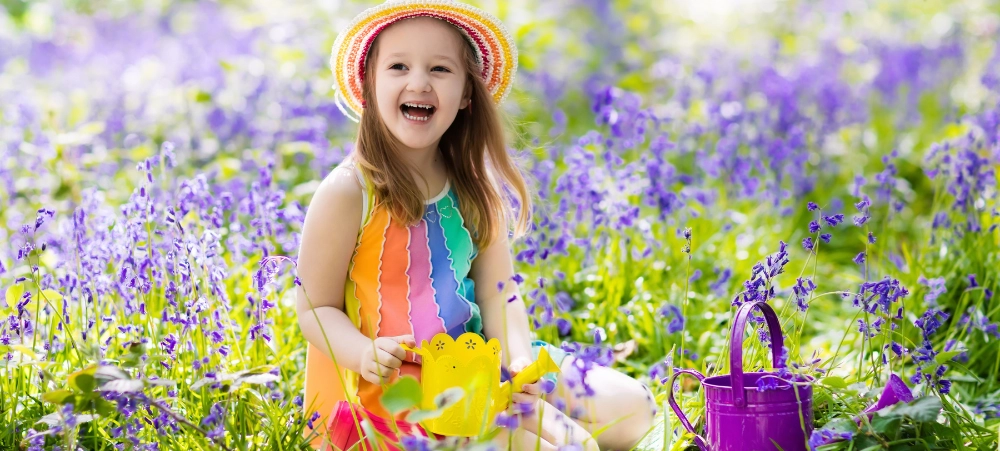In today’s digital age, children often spend more time indoors, engaging with screens and structured activities. However, research highlights the profound benefits of nature play—unstructured outdoor activities that involve natural elements like dirt, leaves, and bugs. These experiences are not only enjoyable but also crucial for a child’s development.
🌱 What Is Nature Play?
Nature play refers to activities where children interact with natural environments, using elements such as soil, water, plants, and insects. Unlike traditional playgrounds with manufactured equipment, nature play encourages creativity and exploration. Activities might include digging in the dirt, collecting leaves, or observing insects in their natural habitat Edge Early Learning.
🌟 Key Benefits of Nature Play
1. Enhances Cognitive and Creative Development
Engaging with natural materials stimulates a child’s imagination and problem-solving skills. Building structures with sticks, creating mud pies, or arranging rocks fosters creativity and critical thinking .
2. Promotes Physical Health
Outdoor play encourages physical activity, improving motor skills, balance, and coordination. Climbing trees, running through fields, or jumping over logs contribute to overall physical development .
3. Supports Emotional Well-being
Spending time in nature has been linked to reduced stress and anxiety levels in children. The natural environment provides a calming effect, promoting emotional stability and resilience .
4. Fosters Social Skills
Nature play often involves group activities, such as building forts or playing games. These interactions help children develop communication, cooperation, and conflict-resolution skills .
5. Encourages Environmental Stewardship
By interacting with nature, children develop an appreciation for the environment. Activities like planting seeds or observing wildlife instil a sense of responsibility and care for the natural world .
🧠 The Science Behind Nature Play
Research indicates that nature play supports various aspects of brain development. The sensory experiences provided by natural environments—such as feeling the texture of leaves, hearing birds chirp, or smelling flowers—stimulate neural connections and enhance sensory processing .
🌍 How to Incorporate Nature Play at Home
- Create a Nature Corner: Dedicate a space in your backyard or balcony with plants, rocks, and natural materials for exploration.
- Go on Nature Walks: Collect leaves, observe insects, or listen to bird calls during walks in parks or forests.
- Gardening Projects: Involve your child in planting and caring for a garden, teaching them about plant growth and responsibility.
- Outdoor Art: Use natural items like leaves and flowers for art projects, such as leaf rubbings or flower pressing.
💬 Final Thoughts
Nature play is more than just fun—it’s an essential component of healthy child development. By providing opportunities for children to engage with the natural world, we support their cognitive, physical, emotional, and social growth. So, let your child get dirty, explore freely, and connect with nature—it’s one of the best things you can do for their development.
Sources:
- Edge Early Learning – The benefits of nature play for children: edgeearlylearning.com.au
- Nido Early School – Benefits of nature play for child development: nido.edu.au
- Busy Bees – The benefits of nature play for your child’s development: busybees.edu.au
- Nursery Consultancy UK – Natural elements and their role in early years child play: nurseryconsultancyuk.co.uk
- Kidz Space – Why is nature play important: kidzspace.com.au
- First Five Years – The benefits of nature play for children: firstfiveyears.org.au
- Free Range Scholars – Benefits of outdoor play in early childhood: freerangescholars.com
We understand that there are many aspects that encompass a Mother, Father or Child and strive toward providing resources and services that accommodates this.
Our content is aimed to inform and educate families on issues starting from pregnancy through to the challenges of the teen-age years.
- Say Hello to the Ultimate Holiday Brunch Bite - December 17, 2025
- Tiny Toons Looniversity Returns: Meet the Voice Behind Plucky and Hamton! - December 12, 2025
- From Pain to Possibility: Panado®’s New Marketing Campaign, Highlights The Joy Of Pain Relief - December 10, 2025






1 thought on “Nature Play 101: Why Dirt, Leaves, and Bugs Are Good for Development”
Adventure awaits outside for childhood development where as screen time limits a child to exposure .